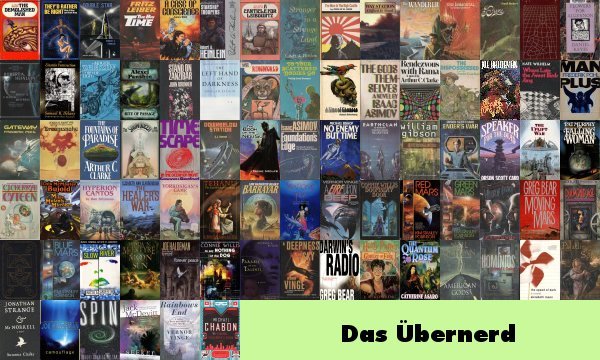 Green Mars
Green Marsby Kim Stanley Robinson
1994 Hugo Winner for Best Novel
Kim Stanley Robinson's Mars Trilogy holds a special place in my heart. Red Mars won the Nebula award while Green Mars and Blue Mars both won the Hugo so it had to be good, right? Well, no. Not only is it not good, it's terrible. Painfully, horribly terrible. And over two thousand pages long for the whole thing. This was a slog along the lines of the Bataan Death March. I've read worse books in the past but the trilogy as a whole comprises the worst reading experience I've had since I made my resolution twenty years ago to avoid reading crap.
The trilogy tells the history of the colonization and terraforming of Mars. Green Mars as the second book takes place after the government has for no good reason specified in the novel attempted the very public assassination of the original founders with absolutely no repercussions for anyone involved. Now those founders who are effectively immortal are in hiding working behind the scenes to build a second civilization on Mars.
Really that's about it for what happens in the book. It goes on and on with minor story events but nothing really happens. Robinson has a droning prose that goes on at extensive length with descriptions of barren landscapes. Without the aimless descriptions of the landscape the book would be half its current length.
The characters read like an attempt to be more "real" by defining them all by psychological problems. The result doesn't make them multi-textured so much as make every single character seem like a whiny high school student. They're all completely unpleasant people to read about mainly because they're all so small-minded and petty that I seriously wondered how they could possibly have ever risen to the top of their profession and been selected for the first permanent settlement on another world. Robinson constantly tells us how great and brilliant they are but you never see it in their actions and their "brilliance" often comes across as inanity.
A perfect example of this is the economic system that Robinson drums into readers at intervals. It is, in short, the most inane adaptation of Marxism I've ever seen in a science fiction book and considering the number of authors in the sixties who wrote books trying to convince people that communism was the real way the future would go that's saying something. The idea, roughly, is that on a planet where resources are painfully scarce that people should be obligated to give things away (including very complicated manufactured goods) and organizations should be forced by the government to stay below a certain size. No totalitarian government is created to enforce this, no social structures are in place to drive this, everyone just goes along with it and for some reason it doesn't completely destroy their industrial development.
I'm only scratching the surface of how bad the Mars trilogy is but I have to same some scorn for Blue Mars which shares all of the problems of the previous books. Since the head-smackingly stupid sociology that infects this book really comes to the forefront there I'll save it (here's a preview: despite more than two hundred years passing and a bursting population the only people important on Mars are the first few people; even their children are marginalized).
The trilogy is really one very long book and I wouldn't read the middle section by itself, but then I couldn't more strongly advise you to avoid the books. If it the painfully dull story isn't enough to make you uninterested then there's the annoying characters. And if you can put up with the annoying characters then you still have to overcome the ham-handed politics and sociology. The only thing that is of any interest in this book are the broad terraforming concepts and you can get more entertainment from those by reading about them in a science text book.
